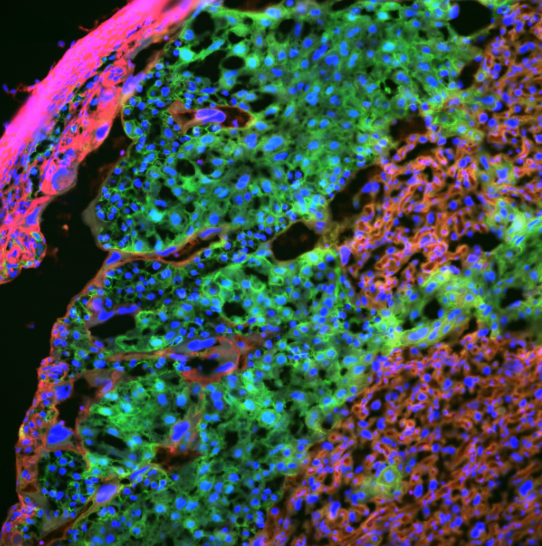Unborn babies use ‘greedy’ gene from dads to ‘remote-control’ mums into feeding them extra food

Credit: Sferruzzi-Perri lab
Unborn babies use ‘greedy’ gene from dads to ‘remote-control’ mums into feeding them extra food
Fetuses use a copy of a gene inherited from their dad to force their mum to release as much nutrients as possible during pregnancy, Cambridge scientists have discovered.
The unborn baby ‘remote controls’ its mother’s metabolism so the two are in a nutritional tug of war. The mother’s body wants the baby to survive but needs to keep enough glucose and fats circulating in her system for her own health, to be able to deliver the baby, breastfeed and to reproduce again.
A new study from the University of Cambridge published today (11 July 2023) examines how the placenta communicates with the mother through the release of hormones so she will accommodate her baby’s growth. The placenta is a vital organ that develops with the fetus in pregnant women and other female mammals to support the developing fetus. In pregnant mice, scientists selectively altered the signalling cells in the placenta that tell mothers to allocate nutrients to her developing fetuses.
Professor Amanda Sferruzzi-Perri, Professor in Fetal and Placental Physiology, a Fellow of St John’s College and co-senior author of the paper, said: “It’s the first direct evidence that a gene inherited from the father is signalling to the mother to divert nutrients to the fetus.”
Dr Miguel Constancia, MRC Investigator based at the Wellcome-MRC Institute of Metabolic Science and co-senior author of the paper, said: “The baby’s remote control system is operated by genes that can be switched on or off depending on whether they are a ‘dad’s’ or ‘mum’s’ gene’, the so-called imprinted genes.
“Genes controlled by the father are ‘greedy’ and ‘selfish’ and will tend to manipulate maternal resources for the benefit of the fetuses, so to grow them big and fittest. Although pregnancy is largely cooperative, there is a big arena for potential conflict between the mother and the baby, with imprinted genes and the placenta thought to play key roles.”
The findings by researchers from the Centre for Trophoblast Research at Cambridge’s Department of Physiology, Development and Neuroscience and the Medical Research Council Metabolic Diseases Unit, part of the Wellcome-MRC Institute of Metabolic Science, have been published in Cell Metabolism.
The baby’s genes controlled by the father tend to promote fetal growth and those controlled by the mother tend to limit fetal growth.
Professor Sferruzzi-Perri explained: “Those genes from the mother that limit fetal growth are thought to be a mother’s way of ensuring her survival, so she doesn’t have a baby that takes all the nutrients and is too big and challenging to birth. The mother also has a chance of having subsequent pregnancies potentially with different males in the future to pass on her genes more widely.”
Researchers deleted the expression of an important imprinted gene called Igf2, which provides instructions for making a protein called ‘Insulin Like Growth Factor 2’. Similar to the hormone insulin, which is responsible for making and controlling glucose levels in our circulation, the gene promotes fetal growth and plays a key part in the development of fetal tissues including the placenta, liver and brain.
Dr Jorge Lopez-Tello, a lead author of the study based at the University’s Department of Physiology, Development and Neuroscience, said: “If the function of Igf2 from the father is switched off in signalling cells, the mother doesn’t make enough amounts of glucose and lipids – fats – available in her circulation. These nutrients therefore reach the fetus in insufficient amounts and the fetus doesn’t grow properly.”
The scientists found that deleting Igf2 from the placenta’s signalling cells affects the production of other hormones that modulate the way the mother’s pancreas produces insulin, and how her liver and other metabolic organs respond.
“We found Igf2 controls the hormones responsible for reducing insulin sensitivity in the mother during pregnancy. It means the mother’s tissues don’t absorb glucose so nutrients are more available in the circulation to be transferred to the fetus,” said Professor Sferruzzi-Perri.
Babies with Igf2 gene defects can be overgrown or growth-stunted. “Until now, we didn’t know that part of the Igf2 gene’s role is to regulate signalling to the mother to allocate nutrients to the fetus,” added Professor Sferruzzi-Perri.
The mice studied were smaller at birth and their offspring showed early signs of diabetes and obesity in later life.
Professor Sferruzzi-Perri said: “Our research highlights how important the controlled allocation of nutrients to the fetus is for the lifelong health of the offspring, and the direct role the placenta plays.
“The placenta is an amazing organ. At the end of pregnancy, the placenta is delivered by the mother, but the memories of how the placenta was functioning leaves a lasting legacy on the way those fetal organs have developed and then how they’re going to function through life.”
The next step is to understand how placental hormones are controlled by Igf2 and what those hormones are doing. Future research could help scientists discover new strategies to target the placenta to improve health outcomes for mums and babies.
Journal
Cell Metabolism
DOI
10.1016/j.cmet.2023.06.007
Method of Research
Experimental study
Subject of Research
Animals
Article Title
Fetal manipulation of maternal metabolism is a critical function of the imprinted Igf2 gene
Article Publication Date
11-Jul-2023




